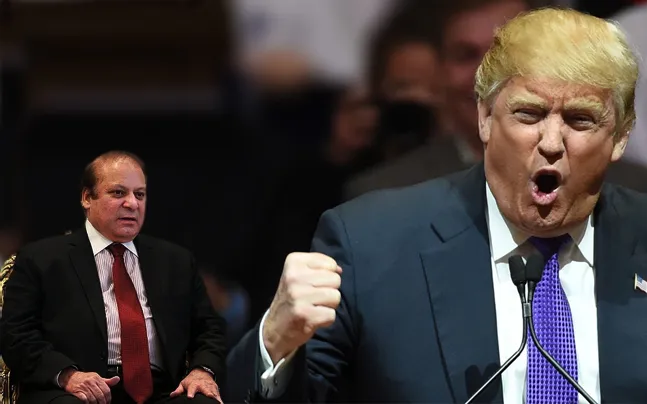
Donald Trump’s exceptionally terrific phone call with Nawaz Sharif on 30 November has been an amusing example of the unpredictability the Trump presidency brings. The flowery language of the phone call, as described by the Pakistani government, included the President-elect congratulating ‘terrific’ Sharif for the ‘amazing work’ he was doing in the country and calling Pakistan a country with ‘tremendous opportunities’ among other things. Given that Trump’s statement was much more sombre, there are two inferences one can make from the first interaction between the two leaders. One, that the Pakistani press release has greatly embellished and exaggerated the nature of the call; and two, that Donald Trump is ignorant of the ground reality in Pakistan and has little knowledge about the nature of US-Pakistan relations. Though both possibilities are conceivable, the latter is highly disturbing. Donald Trump will soon learn that all is not ‘fantastic’ between the United States and Pakistan. Some of the US most intractable policy challenges reside in South Asia and Pakistan is vital to solving those challenges.
Since the invasion of Afghanistan in 2001 in its global war on terror, Pakistan has emerged as a frontline ally of the United States serving as a conduit for international military forces and material to enter Afghanistan. In return for its support, Islamabad has been rewarded with millions in economic and military aid in the form of Coalition Support Funds (CSF). However, despite their public support for the US’ war against terror, Pakistan has continued to provide sanctuary to militant leaders that have American blood on their hands. The 2011 raid in Abottabad that killed Osama bin Laden and the 2015 drone strike that targeted Taliban leader Mullah Mansour near Quetta were a sharp blow to Pakistan’s game of plausible deniability. While the Pakistan army has cracked the whip on militant and terror outfits such as the Pakistani Taliban operating on the Afghan-Pak border they have turned a blind eye to other groups, such as the Haqqani Network that provide operational and logistical support to the Taliban in Afghanistan. It has also failed to act against terrorist leaders of Jaish-e-Mohammad and Lashkar-e-Taiba that target, US’s geopolitical ally, India.
During his campaign trail, Trump had acknowledged that Pakistan had “double dealt” the US and was “semi un-stable”. There are many in his own party that share a similar view of Pakistan being an untrustworthy ally. Representative Ted Poe and Dana Rohrabacher have introduced legislations in the US Congress that aims to designate Pakistan as a state sponsor of terrorism. Senator Bob Corker, another Republican has been instrumental in blocking the Obama administration’s sale of subsidised F-16 fighter jets to Pakistan, until it has demonstrated that it has taken action against the Haqqanis. Given that there has been growing apprehension on Capitol Hill about the feasibility of Pakistan as an American ally, Trump, should be able to find support across the aisle should he chose to deal with Pakistan strongly. The National Defence Authorisation Act 2017 that authorises up to $900 m in CSF to Pakistan has made $400 m contingent on certification from the Secretary of Defence that the Pakistani government is taking demonstrable steps against the Haqqani Network. As a result of Defence Secretary Ash Carter refusing to give certification earlier this year, over $300m of American money was withheld from Pakistan.
The absence of foreign policy and government experience means that Mr. Trump’s past offers little advice on what direction his foreign policies are likely to take. He has in the past acknowledged that Pakistan’s nuclear weapons poses limitations on Washington’s influence over it and has hinted at using India to help the US in securing Pakistan’s nuclear arsenal. He has also stated that he would be “honoured” to help India and Pakistan in “getting along”. Vice President-elect Mike Pence echoed similar sentiments during an interview where he said that Trump could use his “extraordinary deal-making skills” to reduce tensions around the world, when responding to a question on Kashmir. This is disturbing given the additional fact that in his phone call with Sharif, Trump reportedly offered to “play any role that you want me to play.”
Mr. Trump should realise that dealing with Pakistan or ‘playing any role that they want you to play’ might be dangerous. Despite millions in military and economic aid, warnings and threats of coercion Pakistan’s military establishment has failed to change its strategic calculus in its support for the Afghan Taliban and the Haqqani Network. Numerous presidents have tried to mould Pakistan’s security establishment into renouncing terrorism as an instrument of state policy and have failed. Therefore, any subsequent action taken by the Trump administration must be carefully calibrated. Pakistan has used terrorism as an instrument of state policy, sheltering itself under its nuclear umbrella. The key for the Trump administration will be to see through this charade and increase the cost of supporting terror groups for Pakistan so that it chooses to abandon it as an instrument of foreign policy all together. It must emphasise that only after tackling all terror groups can Pakistan begin to make its own demands on the international community.
All through the election, Mr Trump had made the need to tackle radical Islamic terror as a keystone of his platform. His promise to ban Muslims from countries “where there is a proven history of terrorism against the US”, if enforced will cause a setback in the US-Pakistan relationship. The appointment of Michael Flynn, as a National Security Advisor, indicates that the president-elect is serious about his promise on Islamic terror. Flynn who is known for his hawkish views on radical Islam, has also been a strong advocate for cutting Pakistani aid. Given his closeness to Trump, Flynn’s views are likely to shape US foreign policy in the near future. The president-elect will however have to walk a fine line between appeasing Pakistan and reprimanding it, lest it further aggravate the anti-US narrative amongst hardliners, militants and terrorists.
The Trump-Sharif phone call is amusing for the sole reason that the press release has an abundance of misplaced adjectives. While in Islamabad, the phone call was seen as a good start to the Trump-Sharif relationship, New Delhi questioned the reasoning and thinking behind Trump’s alleged words. Giving Pakistan a ‘free ride’ or continuing with a policy similar to that of the Obama administration is not likely to settle well with India. Over the last decade, New Delhi and Washington have established stronger ties in political, economic and security matters. Their rapprochement has been driven by a convergence of strategic interests, something that the US does not share with Pakistan. India and not Pakistan, has in fact been the strong American ally in South Asia, helping Kabul consolidate its democracy and assisting in the necessary infrastructural development to the war-ravaged country.
A Trump offer to mediate on Kashmir will cause a diplomatic setback between the US and India. India has maintained since 1948, that the issue of Kashmir is a bilateral dispute, one that not warrant the involvement of the international community. Pakistan on the other hand, by assisting terrorists that attack India, has provoked calls by other countries to resolve outstanding disputes. By appointing over twenty special envoys on Kashmir to highlight Pakistan’s side of the story at an international level, Islamabad has tried to legitimise its territorial demands. The President-elect therefore must familiarise himself with the historical dispute, before making empty promises. He should encourage a bilateral resolution of the dispute, while rebuking Pakistan to give up its state-sponsored attacks in Kashmir. Given that both the US and India have suffered from terror attacks emanating from Pakistan, Trump must clearly distinguish between friend and foe, and stick to his promise of tackling radical Islamic terror. Pakistan would be a good place to start. This would not only benefit Afghanistan and India, but would also help secure relative peace and stability in South Asia.
Donald Trump will soon enough realise that even though Pakistan has proven to be unreliable friend, it has the potential of becoming America’s reliable enemy. Any drastic reaction against Pakistan can upset the military-intelligence establishment and in turn provoke an opposite reaction in Afghanistan or India. In other words, a withdrawal or cancellation of outstanding aid can push Pakistan’s deep state to increase its support for militant groups that attack Afghanistan and India. This will not only hurt US interests, but will also push Pakistan farther away from the United States’ grasp. Mr. Trump must also comprehend the inconvenient truth that until now, nothing has worked against Pakistan. Therefore, unless Washington has a new ‘trump’ card to play, the cards have been dealt in favour of Islamabad for a long time now.
Read More from Trump and the World Series here:
- Thomas Schelling and the golden age of American strategy
- Trump’s Taiwan rethink and India
- President Donald Trump and future of the Iran deal
The views expressed above belong to the author(s). ORF research and analyses now available on Telegram! Click here to access our curated content — blogs, longforms and interviews.




 PREV
PREV


